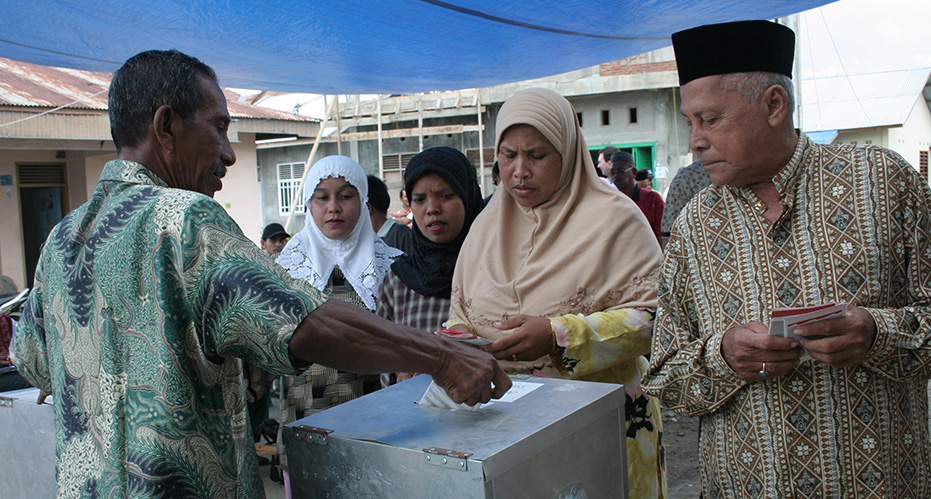Driving commercial and political engagement between Asia, the Middle East and Europe
Driving commercial and political engagement between Asia, the Middle East and Europe
Driving commercial and political engagement between Asia, the Middle East and Europe

Ahead of next year’s Indonesian presidential election, Ciaran Gill explores the key issues that could influence its outcome.
In 2014, the Indonesian presidential election saw Joko Widodo (Jokowi), the ex-governor of Jakarta, sweep to power with more than 53% of the vote. Key to Jokowi’s success were his promises to invest heavily in infrastructure, to attract foreign investment, and to transform Indonesia’s economy into one of the world’s elite.
During the first few years of his presidency, Jokowi oversaw efforts to increase Indonesian growth by initiating attempts to purge corruption from the fabric of national life. The public wins of the country’s anti-corruption commission arguably played a part in increasing the attractiveness of investing in Indonesia. From 2016 to 2017, FDI increased by 8.5 per cent, enabling Jokowi to draw up plans to develop and improve infrastructure inclusive of airports, roads, and light rail networks across the archipelago nation. In the years after 2014, these plans were helped along by the fact that the Indonesian rupiah was sitting at relatively high levels while global oil prices remained low. Jokowi was able to reduce energy subsidies as a result.
Rupiah in trouble
This year, however, has seen the rupiah fall by nearly 10 per cent against the US dollar, a victim of the worldwide sell-off that also inflicted damage to the currencies of Argentina and Turkey. This deterioration, coupled with the rise in global oil prices, has rendered Jokowi’s infrastructure plans considerably more challenging than they would have been in previous years. Import costs have risen substantially.
But it is not just economic woes that have befallen the leader of the world’s third-largest democracy. Indonesia, like many other countries in 2018, is riven with division.
Domestic tensions
Over recent years, an increase in religious intolerance has been identified within Indonesia – a country historically known for its moderate form of Islam. Last year, the Christian governor of Jakarta, Basuki Tjahaja Purnama (known as “Ahok”), was sentenced to two years in prison for blasphemy. And as is the case with many other countries, Indonesia has been experiencing significant problems with online disinformation. Members of an Islamist group called the Muslim Cyber Army have taken to spreading opponents’ personal information across the internet, leading to physical attacks from vigilante groups as a result.
Altogether, these events have helped to create a significant rupture within Indonesian society. With the presidential elections taking place next year, Jokowi will need to address these key issues.
A shift towards populism?
An insight into how he intends to do so came in August of this year, when the Indonesian government published its draft state budget for 2019. In contrast to the budget issued by Jokowi at the beginning of his term, the new draft state budget strikes a more economically populist tone. Amongst other things, it increases social spending by over 30 per cent from the previous year, and increases energy subsidies by 65.6 per cent (rising to 156.5 trillion rupiah).
As Indonesia imports most of its energy from abroad, raising energy subsidies allows Indonesian people to be shielded from the increased energy costs that would stem from volatile global energy markets and a weaker rupiah. Moreover, the draft budget places infrastructure spending at 420.5 trillion rupiah. This is a 2.4 per cent increase from the preceding year, yet still represents the lowest rise in infrastructure spending since the commencement of Jokowi’s term in 2014.
By shifting traction in this way, and reducing imports of goods required for infrastructure development, the aim is that the rupiah will be somewhat buffeted from further losses.
Budgeting for growth
Jokowi affirms that the intention of the budget is to bring about economic growth within Indonesia of around 5.3 per cent, “growth that is more just and equitable”. Acquiring growth in this fashion is, of course, highly laudable. What is striking, however, is Jokowi’s implicit identification of the symbiotic connection between problems of an economic, political, social, and religious nature. By ascertaining that everything is connected, and that economic inequality, for instance, can breed resentment, Jokowi has decided to utilise his economic tools to try and somewhat bridge the division within Indonesian society.
Jokowi’s position is not without challenges, of course. First of all, the draft state budget may not even be adopted, as it still needs to be approved by Indonesian lawmakers. Secondly, a more “just and equitable” growth may smooth domestic relations, yet an increase of subsidies may ultimately result in a diversion of funds away from infrastructure projects and a reduction in FDI.
After all, foreign goods and services are required in order to develop Indonesia’s infrastructure. And this development of infrastructure, in turn, is ultimately pivotal if Indonesia is to become a global economic power in accordance with its true potential.
Ciaran Gill is a writer focusing on Indonesia and ASEAN. He has an MA in International Relations from the University of Leiden.
The upcoming Indonesian elections will be the focus of a briefing from Nezar Patria, Editor-in-Chief of the Jakarta Post, at Asia House on 31 October. Find out more.
